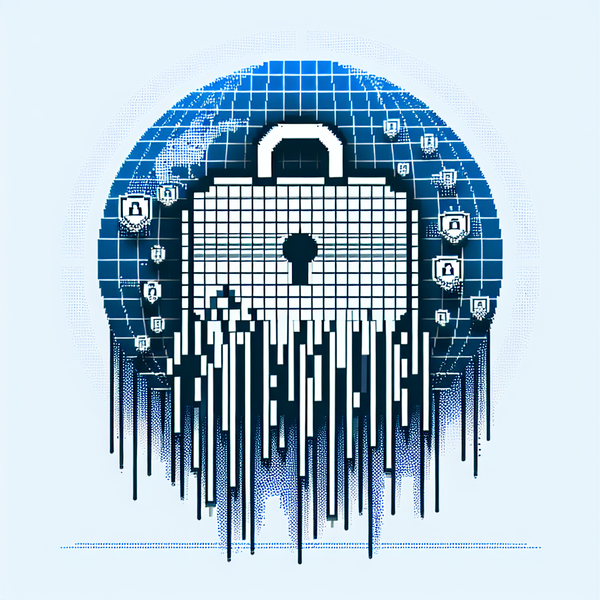Secret CISO 9/12: Vietnam Credit Breach, Vyro AI Leak, SonicWall Exploit, Quantum Security Leap

Welcome to today's edition of Secret CISO, where we unravel the intricate web of cybersecurity challenges and breakthroughs shaping our digital landscape. In this issue, we delve into a series of alarming incidents and promising advancements that underscore the ever-evolving nature of cyber threats and defenses.
Our journey begins in Vietnam, where a suspected cyberattack on the national credit information database raises concerns about financial data security in Southeast Asia. This incident serves as a stark reminder of the vulnerabilities inherent in our interconnected world.
Meanwhile, the Vyro AI data leak highlights the critical importance of maintaining robust cyber hygiene, especially when dealing with generative AI tools. This breach underscores the need for vigilance in safeguarding proprietary and sensitive data.
In the realm of ransomware, Akira hackers exploit vulnerabilities in SonicWall SSL VPNs, prompting urgent calls for timely system patches. Similarly, the US Department of Justice's $11 million bounty on a notorious ransomware kingpin emphasizes the global effort to combat this pervasive threat.
Healthcare data security is thrust into the spotlight with a breach at Cook County Public Health, while Yale New Haven Health proposes an $18 million settlement to address claims from a previous data breach affecting millions.
On the technological frontier, Apple's latest iPhone security feature challenges spyware developers, raising the bar for device security. Concurrently, a breakthrough in quantum key distribution promises unprecedented security for quantum communication systems.
In the world of software vulnerabilities, a critical flaw in Chrome's Serviceworker component earns a researcher $43,000, showcasing the value of bug bounty programs. Meanwhile, a flaw in the Cursor AI code editor highlights the necessity of enabling Workplace Trust to prevent silent code execution.
Finally, we explore a series of CVEs, including vulnerabilities in IBM Fusion, Daikin Security Gateway, and OpenPrinting CUPS, each presenting unique challenges and emphasizing the need for continuous vigilance and timely updates.
Stay informed and stay secure with Secret CISO, your daily guide to navigating the complex world of cybersecurity.
Data Breaches
- Vietnam Probes Suspected Cyberattack on National Credit Information Database: Vietnam is investigating a potential cyberattack on its national credit information database. This incident highlights the increasing threat to financial data security in Southeast Asia. The government is working to assess the damage and implement corrective measures. Source: Business Times.
- Vyro AI Leak Reveals Poor Cyber Hygiene: A data leak involving Vyro AI has brought attention to the risks of sharing proprietary or sensitive data with generative AI tools. This incident underscores the need for better cyber hygiene practices among users to prevent unauthorized data exposure. Source: Dark Reading.
- SonicWall SSL VPN Flaw Exploited by Akira Ransomware Hackers: Akira ransomware hackers have been actively exploiting vulnerabilities in SonicWall SSL VPNs. This exploitation has been acknowledged by the Australian Cyber Security Centre, emphasizing the need for organizations to patch their systems promptly. Source: The Hacker News.
- Cook County Public Health Data Breach: Cook County Public Health experienced a data breach that potentially exposed patients' private information. The breach highlights the vulnerabilities in healthcare data security and the importance of safeguarding sensitive patient information. Source: WDIO.com.
- Yale New Haven Offers $18M to Settle Data Breach Claims: Yale New Haven Health has proposed an $18 million settlement for a data breach affecting over 5 million individuals. This settlement aims to address the claims and mitigate the impact on affected individuals. Source: Law360 UK.
Security Research
- Cursor AI Code Editor Flaw Enables Silent Code Execution via Malicious Repositories: A security flaw in the Cursor AI code editor allows for silent code execution through malicious repositories. This vulnerability highlights the importance of enabling Workplace Trust in Cursor to safeguard against potential threats. Source.
- Apple's Latest iPhone Security Feature Challenges Spyware Makers: Apple's new security feature in the iPhone 17 significantly raises the bar for spyware developers, making it one of the most secure internet-connected environments. This advancement increases the cost and complexity for attackers attempting to exploit the device. Source and Source.
- US DoJ Puts $11 Million Bounty on Ransomware King: The US Department of Justice has announced an $11 million bounty for the capture of a notorious ransomware kingpin responsible for stealing $18 billion. This move underscores the severity of ransomware threats and the global effort to combat cybercrime. Source.
- Quantum Key Distribution Achieves Record Security With Noise Calibration Breakthrough: Researchers have achieved a breakthrough in quantum key distribution by formalizing noise calibration, enhancing the security of quantum communication systems. This advancement optimizes the process to account for spectral properties, marking a significant step forward in quantum security. Source.
- Critical Chrome Vulnerability Earns Researcher $43,000: Google has patched a critical vulnerability in Chrome's Serviceworker component, rewarding the researcher with $43,000. This highlights the ongoing importance of bug bounty programs in maintaining software security. Source and Source.
Top CVEs
- CVE-2025-36222: IBM Fusion 2.2.0 through 2.10.1 and related versions use insecure default configurations that could expose AMQStreams without client authentication. This vulnerability allows attackers to perform unauthorized actions, posing a significant security risk. Source.
- CVE-2025-10127: Daikin Security Gateway is vulnerable to an authorization bypass due to a user-controlled key vulnerability. This flaw allows unauthorized attackers to access the system without prior authentication, potentially compromising sensitive data. Source.
- CVE-2025-58321: Delta Electronics DIALink suffers from a Directory Traversal Authentication Bypass vulnerability. This issue could enable attackers to bypass authentication mechanisms and gain unauthorized access to sensitive directories. Source.
- CVE-2025-59053: AIRI, a self-hosted AI-based Grok Companion, has a vulnerability in its MarkdownRenderer component. This flaw allows cross-site scripting (XSS) and arbitrary command execution due to improper input validation and HTML escaping. The issue is addressed in version v0.7.2-beta.3. Source.
- CVE-2025-58060: OpenPrinting CUPS, an open-source printing system, has an authentication bypass vulnerability in versions 2.4.12 and earlier. When AuthType is set to anything but Basic, the password is not checked if the request contains an Authorization: Basic header, leading to potential unauthorized access. Version 2.4.13 resolves this issue. Source.
API Security
- CVE-2025-10148 predictable WebSocket mask: curl's WebSocket code failed to update the 32-bit mask pattern for each outgoing frame, using a fixed mask instead. This predictability allows a malicious server to induce traffic that could be misinterpreted by a proxy as genuine HTTP traffic, potentially leading to cache poisoning. Source: Vulners.
- CVE-2025-8557: An internal audit of Lenovo XClarity Orchestrator revealed a vulnerability allowing attackers on the local network to manipulate devices to create alternate communication channels. This could enable unauthorized access to internal API services, although remote exploitation is not possible. Source: Vulners.
- CVE-2025-59053: AIRI, a self-hosted AI-based Grok Companion, had a vulnerability in its MarkdownRenderer component, leading to cross-site scripting (XSS) and potential command execution. The issue was fixed in version 0.7.2-beta.3. Source: Vulners.
- CVE-2025-58065: Flask-AppBuilder's password reset endpoint remained accessible even when using non-database authentication methods, allowing users to reset passwords and create JWT tokens after being disabled. Upgrading to version 4.8.1 or later is recommended. Source: Vulners.
- CVE-2025-43782: An IDOR vulnerability in Liferay Portal and DXP allowed remote authenticated users to access workflow definitions by name, potentially exposing sensitive information. Source: Vulners.
Sponsored by Wallarm API Security Solution
Final Words
As we wrap up today's edition of Secret CISO, it's clear that the cybersecurity landscape is ever-evolving and increasingly complex. From Vietnam's investigation into a potential cyberattack on its national credit database to the vulnerabilities exposed in AI tools and VPNs, the need for robust security measures has never been more critical.
We've seen how poor cyber hygiene can lead to significant data leaks, as highlighted by the Vyro AI incident, and the importance of timely patching to prevent exploits, as demonstrated by the SonicWall SSL VPN flaw. The healthcare sector, too, faces its own challenges, with breaches like the one in Cook County underscoring the need for stringent data protection.
On a brighter note, advancements in technology, such as Apple's latest iPhone security feature and breakthroughs in quantum key distribution, show promise in fortifying our defenses against cyber threats. Meanwhile, initiatives like Google's bug bounty program continue to incentivize the discovery and resolution of vulnerabilities, ensuring a safer digital environment for all.
As we continue to navigate these challenges and opportunities, remember that staying informed is your first line of defense. If you found today's insights valuable, please share this newsletter with your friends and colleagues. Together, we can build a more secure digital world.
Until next time, stay vigilant and stay secure!




